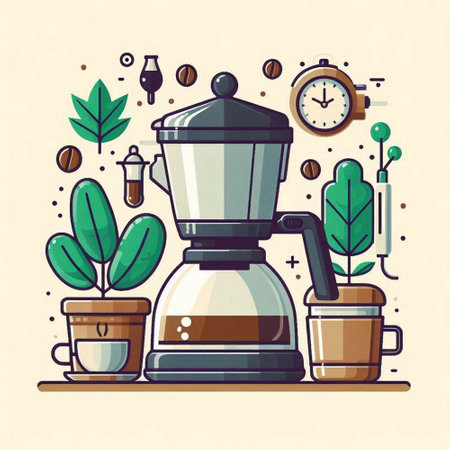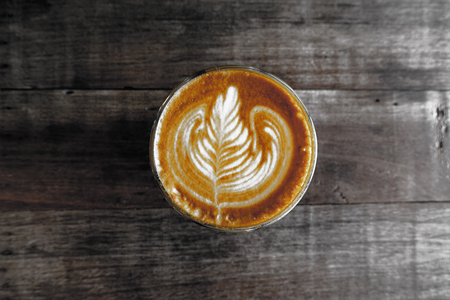Introduction: The Green Revolution in British Coffee Culture
Across the UK, a quiet transformation is brewing in the world of coffee. Once considered simply a daily pick-me-up or a social ritual, grabbing a cup of coffee at your local café now comes with an added layer of consciousness—a growing commitment to sustainability. From bustling London high streets to charming corners of Edinburgh and Brighton, British cafés are embracing eco-friendly practices that are subtly but powerfully reshaping how we experience our daily brew. With more Britons than ever before keenly aware of their environmental footprint, café culture is evolving to reflect these values, weaving sustainability into everything from bean sourcing to takeaway packaging. This fresh wave of green thinking doesn’t just alter what’s in our cups; it redefines the entire café experience, inviting us all to sip more thoughtfully and savour every moment with a lighter impact on the planet.
2. Sourcing Matters: Ethical Beans and Local Roasters
Across Britain’s bustling café scene, a quiet revolution is brewing—one rooted in the conscious selection of coffee beans. Today, discerning British coffee drinkers are asking not just how their flat white tastes, but where its journey began. This has propelled a notable shift towards ethically sourced beans, with transparency and traceability at the forefront of café culture. Coffee lovers are increasingly drawn to establishments that partner with independent British roasters, valuing both the positive environmental impact and the support for local enterprise.
Ethical sourcing means more than just ‘Fairtrade’ stickers on bags; it’s about forging genuine relationships with farmers, paying fair prices, and prioritising sustainability from crop to cup. Many UK cafés now champion single-origin coffees, clearly displaying the bean’s provenance and sharing stories behind each harvest. In this way, sustainability becomes part of the daily ritual—imbued in every sip.
The Rise of Independent Roasters
Britain’s independent roasters have become tastemakers in their own right. From Cornwall to the Highlands, these passionate artisans roast in small batches, often using renewable energy and minimising waste. This not only guarantees freshness but also creates a unique sense of place—each cup reflecting its local roots. For cafés, collaborating with nearby roasteries fosters community ties while reducing food miles.
Ethical Sourcing vs Mass Production: A Quick Comparison
| Aspect | Ethically Sourced & Local Roasters | Mass-Produced Coffee |
|---|---|---|
| Bean Origin Transparency | High (often single origin) | Low (blended sources) |
| Environmental Impact | Sustainable practices prioritised | Often overlooked |
| Community Support | Supports local businesses & farmers | Mainly benefits large corporations |
Savouring Sustainability in Every Sip
The growing popularity of ethical sourcing and local roasting reflects a broader commitment to sustainability within British coffee culture. Whether you’re enjoying a meticulously crafted brew in an East London hideaway or a seaside café in Brighton, you’re likely tasting the future—one where every cup supports both people and planet.

Café Interiors: Sustainable Design Aesthetics
Step inside any of Britain’s forward-thinking cafés and you’ll quickly notice that sustainability isn’t just about what’s in your cup – it’s woven into the very fabric of the space. Across London’s bustling high streets, quaint corners in Edinburgh, and Brighton’s bohemian lanes, a growing number of independent coffee shops are championing eco-friendly design with a distinctly British twist. Exposed brickwork is paired with recycled timber tables, while vintage armchairs rescued from local charity shops invite patrons to linger. The use of reclaimed wood not only gives interiors a warm and storied feel but also reduces the demand for new resources. Many British cafés pride themselves on celebrating homegrown materials, with slate, stone, and even sheep’s wool insulation sourced from UK suppliers. Upcycled industrial fixtures—think pendant lamps fashioned from old copper kettles or shelving made from railway sleepers—merge practical sustainability with an understated sense of style. These design choices aren’t just about aesthetics; they tell a story of heritage and environmental responsibility, reflecting both the café owners’ values and the character of their communities. This blend of eco-style and British charm is redefining what it means to enjoy coffee out: every detail, from the locally-made ceramics to the antique mirrors, reinforces a commitment to conscious living without sacrificing comfort or taste.
4. Cup Culture: The Movement Away from Single-Use
If you wander into any British café these days, you’ll notice a striking shift in “cup culture.” Sustainability has taken centre stage, with cafés rethinking the way coffee is served and enjoyed. From the bustling streets of London to the indie corners of Edinburgh, there’s a growing momentum away from single-use cups towards more eco-conscious solutions.
Spotlight on Reusable Cups
One of the most visible changes is the widespread adoption of reusable cups. Many British cafés now offer branded reusable cups for sale, often providing customers with a discount if they bring their own. This not only reduces waste but also turns an everyday item into a style statement—a nod to both sustainability and British flair.
Biodegradable Packaging: An Earth-Friendly Alternative
Traditional plastic-lined cups are being replaced with biodegradable alternatives made from materials like plant starch or recycled paper. Leading coffee chains and independent shops alike are investing in packaging that breaks down naturally, helping to reduce landfill waste and carbon footprints. These innovations are proving that sustainability can go hand-in-hand with quality and design.
The British Embrace of Bring-Your-Own-Mug Schemes
The bring-your-own-mug (BYOM) movement has found a particularly enthusiastic audience across the UK. Whether it’s a ceramic mug from home or a sleek travel cup, Brits are embracing this new ritual as part of their daily routine. Cafés have responded by offering incentives, such as loyalty stamps or discounts, encouraging customers to make the switch permanent.
| Initiative | Description | Popular Café Examples |
|---|---|---|
| Reusable Cups | Discounts for bringing your own cup; branded reusable cups for sale | Pret A Manger, Costa Coffee, Independent cafés nationwide |
| Biodegradable Packaging | Cups and lids made from compostable materials | Gail’s Bakery, Greggs, Local eco-cafés |
| Bring-Your-Own-Mug Schemes | Loyalty rewards for customers who bring their own mugs | Starbucks UK, Leon, Artisan coffee houses |
This evolving cup culture not only aligns with Britain’s deepening commitment to sustainability but also reflects a sense of personal responsibility and community pride. By championing these initiatives, British cafés are leading by example—one cup at a time.
5. Community and Consciousness: British Cafés as Sustainability Champions
Across the UK, cafés are blossoming into more than just places to sip a flat white or enjoy a slice of Victoria sponge—they are becoming vibrant hubs for community-driven sustainability. Many independent coffee shops have taken it upon themselves to nurture green habits by actively engaging with their neighbourhoods. Whether it’s hosting hands-on sustainability workshops—think upcycling sessions or zero-waste cooking classes—or partnering with local charities to support environmental initiatives, these cafés are making a tangible difference on the high street. By inviting patrons to participate in eco-friendly events and encouraging everyday choices like reusable cups or plant-based milks, British cafés are sparking a collective consciousness around greener living. It’s this sense of togetherness and purpose that not only fosters loyalty among regulars but also inspires wider communities across the country to tread more lightly on the planet.
6. Looking Ahead: The Future of Sustainable Coffee in Britain
As Britain’s café scene continues to evolve, sustainability is set to remain at the heart of this transformation. The next wave of eco-friendly trends is already brewing, poised to reshape how we enjoy our daily cup. From innovative packaging solutions—think compostable cups and reusable schemes—to zero-waste coffee bars popping up in cities like London and Bristol, cafés are exploring creative ways to reduce their environmental footprint.
Technology and Traceability
Advancements in technology are making it easier for British coffee lovers to trace their beans from farm to flat white. Apps and QR codes now allow customers to discover the origin story behind each roast, building a deeper connection between the drinker, the café, and the global farming community. This transparency not only celebrates ethical sourcing but also encourages mindful consumption across the UK’s high streets.
Embracing Local and Seasonal
Another trend gaining momentum is the focus on local and seasonal ingredients—yes, even in your latte! Expect more cafés to showcase British dairy alternatives, homemade syrups using regional fruits, and partnerships with local bakeries for that perfect pairing. This commitment supports neighbourhood economies while reducing carbon footprints associated with long-distance shipping.
The Rise of Community-Centred Spaces
Sustainability isn’t just about what’s in your cup; it’s also about fostering community. Look out for cafés hosting workshops on composting, upcycling coffee grounds into soaps or scrubs, and encouraging reusable cup culture through incentives. These grassroots initiatives are turning cafés into hubs for green-minded locals who want to sip responsibly.
Ultimately, as British consumers become ever more environmentally conscious, their expectations will continue to push cafés towards greater innovation. Whether you’re a regular at an independent spot in Edinburgh or grabbing a quick takeaway in Manchester, sustainable practices are shaping a new era of café culture—one that blends tradition with forward-thinking flair. As we look ahead, one thing is certain: the future of British coffee is as rich in flavour as it is in purpose.


